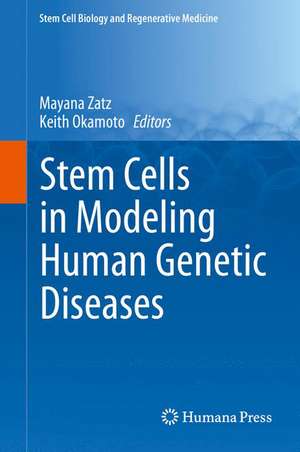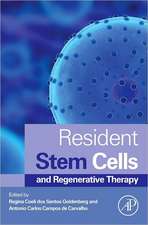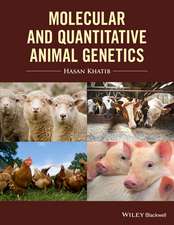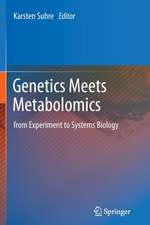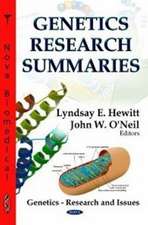Stem Cells in Modeling Human Genetic Diseases: Stem Cell Biology and Regenerative Medicine
Editat de Mayana Zatz, Oswaldo Keith Okamotoen Limba Engleză Hardback – 21 aug 2015
| Toate formatele și edițiile | Preț | Express |
|---|---|---|
| Paperback (1) | 548.28 lei 38-44 zile | |
| Springer International Publishing – 22 oct 2016 | 548.28 lei 38-44 zile | |
| Hardback (1) | 641.71 lei 22-36 zile | |
| Springer International Publishing – 21 aug 2015 | 641.71 lei 22-36 zile |
Din seria Stem Cell Biology and Regenerative Medicine
- 18%
 Preț: 625.05 lei
Preț: 625.05 lei - 18%
 Preț: 958.07 lei
Preț: 958.07 lei - 18%
 Preț: 897.65 lei
Preț: 897.65 lei - 18%
 Preț: 1122.56 lei
Preț: 1122.56 lei - 18%
 Preț: 1118.62 lei
Preț: 1118.62 lei - 18%
 Preț: 1556.64 lei
Preț: 1556.64 lei - 18%
 Preț: 1222.31 lei
Preț: 1222.31 lei - 18%
 Preț: 1280.72 lei
Preț: 1280.72 lei - 18%
 Preț: 948.61 lei
Preț: 948.61 lei - 18%
 Preț: 1280.24 lei
Preț: 1280.24 lei - 5%
 Preț: 779.16 lei
Preț: 779.16 lei - 18%
 Preț: 1278.02 lei
Preț: 1278.02 lei - 18%
 Preț: 947.35 lei
Preț: 947.35 lei - 18%
 Preț: 949.55 lei
Preț: 949.55 lei - 18%
 Preț: 951.29 lei
Preț: 951.29 lei - 18%
 Preț: 953.65 lei
Preț: 953.65 lei - 15%
 Preț: 691.12 lei
Preț: 691.12 lei - 18%
 Preț: 1220.75 lei
Preț: 1220.75 lei - 18%
 Preț: 956.81 lei
Preț: 956.81 lei - 15%
 Preț: 643.16 lei
Preț: 643.16 lei - 18%
 Preț: 1229.91 lei
Preț: 1229.91 lei - 15%
 Preț: 693.71 lei
Preț: 693.71 lei - 18%
 Preț: 944.99 lei
Preț: 944.99 lei - 15%
 Preț: 692.74 lei
Preț: 692.74 lei - 18%
 Preț: 1222.01 lei
Preț: 1222.01 lei - 15%
 Preț: 696.18 lei
Preț: 696.18 lei - 18%
 Preț: 959.98 lei
Preț: 959.98 lei - 18%
 Preț: 963.91 lei
Preț: 963.91 lei - 18%
 Preț: 1380.47 lei
Preț: 1380.47 lei - 15%
 Preț: 690.44 lei
Preț: 690.44 lei - 15%
 Preț: 641.85 lei
Preț: 641.85 lei - 18%
 Preț: 1837.45 lei
Preț: 1837.45 lei - 15%
 Preț: 646.11 lei
Preț: 646.11 lei - 18%
 Preț: 1118.62 lei
Preț: 1118.62 lei - 5%
 Preț: 777.55 lei
Preț: 777.55 lei - 18%
 Preț: 1222.01 lei
Preț: 1222.01 lei - 18%
 Preț: 1241.73 lei
Preț: 1241.73 lei
Preț: 641.71 lei
Preț vechi: 754.95 lei
-15% Nou
Puncte Express: 963
Preț estimativ în valută:
122.83€ • 133.47$ • 103.24£
122.83€ • 133.47$ • 103.24£
Carte disponibilă
Livrare economică 31 martie-14 aprilie
Preluare comenzi: 021 569.72.76
Specificații
ISBN-13: 9783319183138
ISBN-10: 3319183133
Pagini: 147
Ilustrații: XII, 147 p. 16 illus., 15 illus. in color.
Dimensiuni: 155 x 235 x 14 mm
Greutate: 0.45 kg
Ediția:1st ed. 2015
Editura: Springer International Publishing
Colecția Springer
Seria Stem Cell Biology and Regenerative Medicine
Locul publicării:Cham, Switzerland
ISBN-10: 3319183133
Pagini: 147
Ilustrații: XII, 147 p. 16 illus., 15 illus. in color.
Dimensiuni: 155 x 235 x 14 mm
Greutate: 0.45 kg
Ediția:1st ed. 2015
Editura: Springer International Publishing
Colecția Springer
Seria Stem Cell Biology and Regenerative Medicine
Locul publicării:Cham, Switzerland
Public țintă
ResearchCuprins
Modeling Fragile X Syndrome in Human Pluripotent Cells.- Induced Pluripotent Stem Cells in Familial Dilated Cardiomyopathy.- Induced Pluripotent Stem Cells and Amyotrophic Lateral Sclerosis.- IPS Cells and Spinocerebellar Ataxia.- Induced Pluripotent Stem Cells and Vascular Disease.- iPS Cells and Cardiomyopathies.- Cancer Stem Cells and Chemoresistance.- Stem Cells in Autism Spectrum Disorders.
Recenzii
“The target audience of this book are students, researchers and clinicians interested in the recent developments in the field. The book is well written and, thanks to the good introductory section in each of the chapters, even non-experts in the field will be able to follow. The figures in the book are well-designed … . The book gives a good overview about the current state of research in these fields and can therefore be recommended for interested readers.” (Christian Schnell, Human Genetics, Vol. 135, 2016)
Notă biografică
Dr. Mayana Zatz is a professor of Human and Medical Genetics and is currently the director of the Human Genome Research Center and Institute of stem-cells in genetic disorders, at the University of São Paulo. She completed a Ph.D. in Human and Medical Genetics there and was a post-doc in medical genetics at the University of California. Her research in human and medical genetics focuses mainly on the following aspects of neuromuscular disorders: novel genes identification, genotype-phenotype correlations, mechanisms of clinical variability and stem-cells as a tool to understand gene expression and their therapeutic applications. She published about 300 peer-reviewed papers that were cited 8700 times ( h=43). She has been actively involved in ethical aspects related to genome research, genetic testing and political decisions regarding the approval of the Brazilian embryonic stem-cell bill by the Congress in 2005 and by the Supreme Court in 2008.
Dr. O. Keith Okamoto is a professor in the Department of Genetics and Evolutionary Biology at the University of São Paulo (USP). Prior to joining the University, he was a professor of Neurosciences at the Medical School of the Federal University of São Paulo. He earned his Ph.D. in Biochemistry and Molecular Biology at the USP and he conducted research as a postdoctoral fellow in the Department of Molecular and Cellular Biology at Harvard University, where he was also affiliated to the Harvard’s Bauer Center for Genomics Research. Dr. Okamoto is a member of the Brazilian Cell Therapy Network, and head of the Translational Genomics Laboratory at USP. His current research focuses on the interplay between stem cell biology and cancer, with emphasis on the genetic and molecular mechanisms inducing a stem cell-like phenotype in cancer cells, their role in tumor heterogeneity and aggressiveness, and the contribution of normal stem cells to tumor development and metastasis. Preclinical therapy studies for cancer and some neurological disorders comprise another major scientific interest of his group.
Dr. O. Keith Okamoto is a professor in the Department of Genetics and Evolutionary Biology at the University of São Paulo (USP). Prior to joining the University, he was a professor of Neurosciences at the Medical School of the Federal University of São Paulo. He earned his Ph.D. in Biochemistry and Molecular Biology at the USP and he conducted research as a postdoctoral fellow in the Department of Molecular and Cellular Biology at Harvard University, where he was also affiliated to the Harvard’s Bauer Center for Genomics Research. Dr. Okamoto is a member of the Brazilian Cell Therapy Network, and head of the Translational Genomics Laboratory at USP. His current research focuses on the interplay between stem cell biology and cancer, with emphasis on the genetic and molecular mechanisms inducing a stem cell-like phenotype in cancer cells, their role in tumor heterogeneity and aggressiveness, and the contribution of normal stem cells to tumor development and metastasis. Preclinical therapy studies for cancer and some neurological disorders comprise another major scientific interest of his group.
Textul de pe ultima copertă
Using stem cells to investigate currently untreatable human genetic diseases is the focus of this book. Several applications of the Nobel-Prize winning, revolutionary iPS cell technology are explored in detail, including in schizophrenia, autism, Huntington’s disease, Alzheimer’s disease, spinocerebellar ataxia, medulloblastoma heterogeneity, progeria, age-related macular degeneration, and muscular dystrophy . The book is divided into seven sections, each composed of authoritative and detailed chapters. The first section provides a theoretical and practical overview of stem cells in disease modeling. The following sections divide stem cell applications into various classes of pathology- psychiatric disorders, neurodegenerative disease, neurogenesis-associated disorders, and laminopathies. Following these sections, the book discusses the future perspectives- and challenges- of iPS technology.
Broad in scope and in audience, Stem Cells in Modeling Human Genetic Diseases for postgraduate students, scientists, and clinicians interested in applications of the rapidly developing field of stem cell research in disease modeling and drug development and its dynamic role within regenerative medicine.
Broad in scope and in audience, Stem Cells in Modeling Human Genetic Diseases for postgraduate students, scientists, and clinicians interested in applications of the rapidly developing field of stem cell research in disease modeling and drug development and its dynamic role within regenerative medicine.
Caracteristici
Covers several examples of using iPS cell technology in obtaining patient-specific PSCs which can be used to generate many types of specialized disease cells Discusses a wide range of genetic diseases including psychiatric and neurodegenerative disorders and more, for which there are no available treatment Essential for postgraduate students, scientists and clinicians interested in this rapidly developing field’s applications in disease modeling, drug development and emerging issues Includes supplementary material: sn.pub/extras
